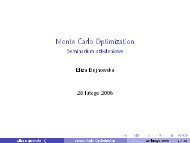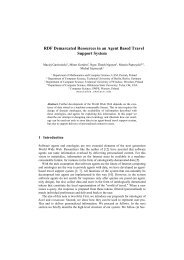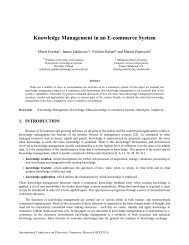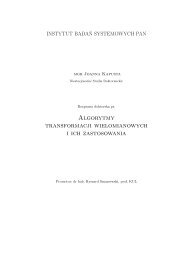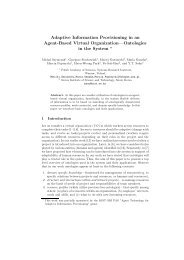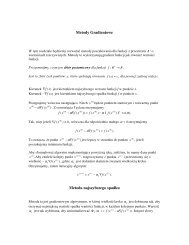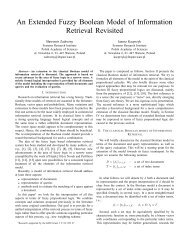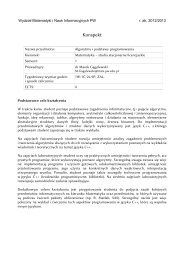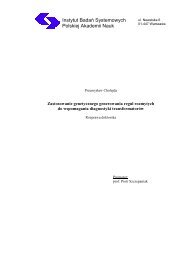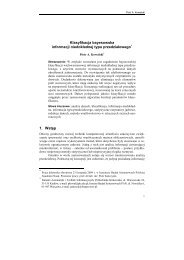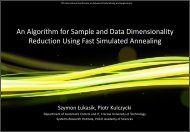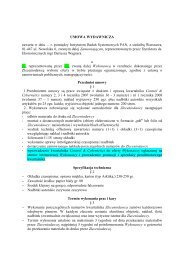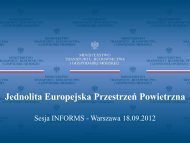Combining Information from Multiple Internet Sources
Combining Information from Multiple Internet Sources
Combining Information from Multiple Internet Sources
Create successful ePaper yourself
Turn your PDF publications into a flip-book with our unique Google optimized e-Paper software.
application presented in this paper combines the retrieved results using advanced methods.<br />
In this approach application utilizes agents as experts in knowledge extracted <strong>from</strong> the<br />
results provided by search engines. It uses JADE agent framework to create a multi-agent<br />
environment which aids information retrieval. It is interfaced through a web page when one can<br />
input a query and wait for the result. In the core of the system agents serve as miners of data <strong>from</strong><br />
multiple search engines. Simply saying, they possess the knowledge that we are apparently looking<br />
for. So, when we ask several experts the same question we expect that they will provide us with the<br />
best results possible. Would not it be better if they arrived at some agreement about the answer thus<br />
giving us a single combined opinion This thesis aims at answering those questions. It investigates<br />
coherency and performance of each of the three methods used for filtering the answers so that the<br />
filtered result sets are smaller but hopefully more meaningful. Those methods are then compared<br />
with each other; to see which one provides the most promising results.<br />
There are three methods utilized in this work for yielding the final results: Game theory,<br />
Auction and Consensus. In the Game theory approach the process of combining results is compared<br />
to a game in which the game players are agents that decide about the information destination by<br />
either discarding or keeping it. An Auction based approach is almost similar to the “real-life”<br />
auction, but here agents decide about which information can be obtained for the lowest price.<br />
Consensus method uses more centralized approach since it takes the highest-ranked information<br />
<strong>from</strong> all result sets and checks how common is this result among those obtained <strong>from</strong> all search<br />
engines. All of those methods are described in the thesis; their implementation and effectiveness are<br />
presented.<br />
While consensus algorithm was already used as a tool for combining information <strong>from</strong> search<br />
engines [1], two other algorithms: Game theory and Auction were used for a different task - as<br />
methods of negotiation in Agent-based system for classification tasks - the NeurAge system,<br />
described in [7], [8] and [9]. Since Consensus based approach had been used as a way for<br />
combination of information retrieved <strong>from</strong> multiple <strong>Internet</strong> sources, there was no need for adapting<br />
the algorithm to our needs - it was used in the same manner as in [1]. Furthermore, in the AGWI<br />
system search engines were selected randomly – there were more search engines than agents<br />
utilizing those. On the other hand, Game theory and Auction required adjusting to deal with data<br />
fundamentally different <strong>from</strong> what they were dealing with in their original version. Adjustment<br />
details are presented further in the paper; mainly in chapter 3.<br />
1.1 Aim of the thesis<br />
Are the Game theory based, Auction based and Consensus based approaches a good way of<br />
combining the information obtained <strong>from</strong> multiple <strong>Internet</strong> sources By creating an application<br />
3



